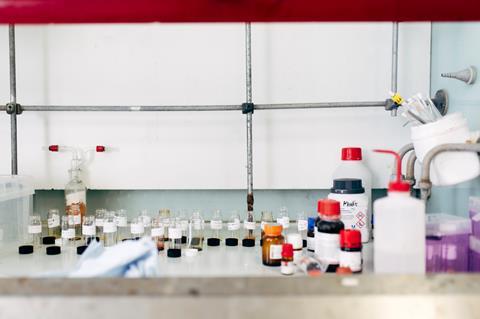Even working at the cutting edge can sometimes feel like a drag

It’s one of those days. Work in the lab just isn’t going smoothly – in fact, it doesn’t feel like it’s going at all. Sometimes, it even feels as if the laws of science aren’t acting on your molecules any more, or that the forces of the universe are conspiring against you. A simple ester formation that should obviously work gives you immense trouble, or a reaction you’ve done before suddenly and mysteriously seems to stop working.
On another day, these small snags wouldn’t hold you back at all: rather, you’d welcome them. That ester formation shows you that one part of the molecule is more acid-sensitive than expected, and in fact now you can use a milder, cleaner method than your go-to SOCl2. And your strangely sensitive reaction allows you to showcase your reaction pathologist skills to your new manager.
But today is one of those days. You know that blaming the universe is irrational, but you feel impotent and helpless. And then, resigned and defeated, you see your tired response in context.
Over the last month, there have been disagreements on your project direction. Perhaps you’re a student who came up with a great idea you were raring to get going with, but your naysaying supervisor told you it’d never work. Or maybe you’re unconvinced about the brand-new direction your group leader is pushing for your project. You spend your column-running daydream time coveting your labmate’s fast-moving project, but this time round you have no power to alter your lot.
Perhaps you’re a research assistant, and your assigned tasks are below the level you expected from your broad previous experience. You want to work on cutting-edge chemistry again, but here you are making buffers for the lab and answering emails all morning. Your vacuum pump’s not as good as it used to be. The communal glassware is all dirty, and when you politely point this out, you receive blank stares and indifference in return.
Or maybe things are going critically wrong. Your project is cancelled due to failed toxicology studies, your paper is scooped, your cleverly designed catalyst doesn’t work. Now it seems like every piece of your work for a year (or several years) has been fruitless, and all you have left are learnings and memories. Time to move on to the next ride, but you’re not sure what that journey even is.
So it’s no wonder you feel like the victim of a cosmic conspiracy. But this is not the twilight zone. This is just one of those days. When an emotionally cognate version of this happened to your far ancestors in the days before lab coats existed, they probably sighed, collected their family together and performed a sacred dance to the gods. Rituals won’t work on your problem, but they might work on you. So when these days come around, take a moment to step back and remember: we do incredible work.
Chemists go out every morning to transform the very fabric of matter and expand the bounds of human knowledge. In the day-to-day grind, it can be easy to forget that not only is that work of use to humanity but it is also indescribably cool. I was chatting with a bike mechanic a few months ago when sourcing parts for my dodgy wheel, and he asked me what I did. ‘Wow – you run chemical reactions, with robots?’ His eyes were like saucers.
I once made a complex small-molecule catalyst and told my non-chemist friend how I’d just tethered 104 atoms in exactly the right locations relative to each other to do my bidding in the flask. He didn’t care that the catalyst wasn’t very good at enantioinduction, he just exclaimed ‘But how?!’
We have the luck and the privilege to work on the very nature of reality. Most people end up out of the lab, albeit many (presumably the majority) deliberately so. One day that might be you; and one day you might even miss days like these. Chemistry is cool. Let’s go out there and make it happen.












1 Reader's comment